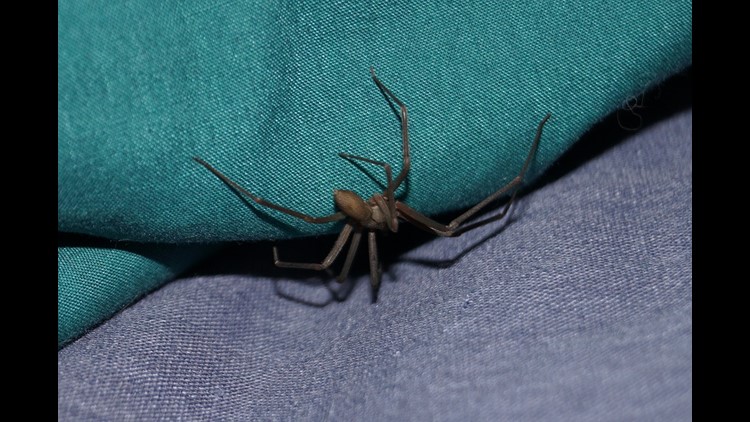By JENNIFER EARL
A family in Michigan is scratching their heads after discovering unusual tenants inside their garage last week.
On the floor of their unheated, detached garage in Davison, they spotted two long-legged spiders, which turned out to be brown recluse spiders -- a dangerous type of spider with a powerful bite. Most bites are minor, but occasionally, skin around a brown recluse bite will become necrotic, turning a dark color and becoming a deep, open sore as it dies.
The family has no idea where the spiders with 3- to 5-inch-long legs came from or how they made their way into their garage.
Howard Russell, an entomologist at Michigan State University Diagnostic Services, confirmed the spiders were, in fact, brown recluses.
"I've been doing this for 30 years," Russell told CBS News. "I've had eight brown recluse out of thousands of spiders submitted, so they're rare."
Russell explained that brown recluse spiders are usually found in more southern states with warmer climates, such as Tennessee, Arkansas, Missouri or Kentucky.
"That seems to be the heart of where they're found," Russell said.
So it was surprising to stumble across the dangerous brown recluse in such a cool climate.
"The spiders had survived the winter in that unheated garage," Russell added. "There was no recent history of travel, in some other cases there were."
In 2011, there were three isolated populations of the brown recluse reported in Lansing, Hillsdale and Flint. Since then, three additional populations of the brown recluse have been confirmed in Michigan. These new finds were located in Tecumseh in 2015, Ann Arbor in 2016 and now Davison in 2017.
"The Tecumseh population was sharing a home with a human family of five including three young children and two dogs. The homeowner believes the spiders arrived with new kitchen cabinets the previous owner had installed before the family purchased it," according to a recent Michigan State University Extension report. "The Ann Arbor specimen came from a building on the University of Michigan campus."
Now Russell is trying to figure out where these creatures came from.
"The interesting question research-wise here: Do these represent sort of a transported population or does this represent the leading edge of a spread of these things to the Midwest?" he asked.
While it may be a frightening finding, Russell wants to assure residents there are deadlier species.
"We have Northern Widows up here, too, which are probably as dangerous or more dangerous than recluse spiders," Russell said. "A lot more people get sick by bee or wasp stings."
If you spot a spider that resembles the brown recluse, call an expert, Russell advises.
"Have it confirmed by somebody who actually knows spiders -- and possibly confirmed by somebody who doesn't have business interest in the result of that determination," he adds.



